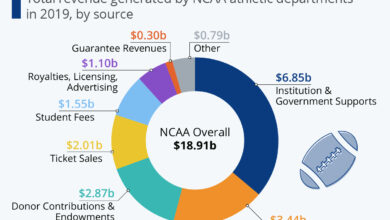How To Get A Sports Scholarship – A Comprehensive Guide
How to get a sports scholarship is a crucial topic for aspiring student-athletes looking to secure financial support for their education. This guide will delve into the various aspects of the scholarship process, providing valuable insights and tips for success.
From researching different types of scholarships to showcasing skills and talents, this guide covers everything you need to know to increase your chances of landing a sports scholarship.
Researching Sports Scholarships
Researching sports scholarships is crucial for athletes looking to further their education while continuing to excel in their sport. Here are some key points to consider:
Types of Sports Scholarships:
- Athletic Scholarships: Offered by colleges to recruit talented athletes for their sports teams.
- Merit-Based Scholarships: Awarded to students based on their academic achievements and athletic abilities.
- Need-Based Scholarships: Provided to students who demonstrate financial need in addition to athletic talent.
- Sports-Specific Scholarships: Targeted towards athletes in specific sports, such as basketball, soccer, or swimming.
Eligibility Criteria:
- Strong academic record: Maintaining a good GPA is often a requirement for sports scholarships.
- Athletic achievements: Demonstrating excellence in your chosen sport through competitions and accolades.
- Recommendations: Having coaches or mentors vouch for your skills and character.
- Compliance with NCAA or NAIA rules: Following the regulations set by these governing bodies for college sports.
Where to Find Information:
- College websites: Many universities provide details about their sports scholarship programs on their websites.
- Guidance counselors: Seek guidance from your school counselor on how to navigate the scholarship search process.
- Athletic associations: Organizations like the NCAA or NAIA can offer resources and information on sports scholarships.
- Online databases: Websites like Fastweb or Scholarships.com can help you search for sports scholarships that match your profile.
Building a Strong Athletic Profile
When it comes to securing a sports scholarship, having a strong athletic profile is crucial. Coaches look for specific qualities and achievements in potential scholarship athletes that go beyond just athletic performance. Let’s dive into what coaches typically look for and how you can enhance your athletic profile to stand out.
Qualities Coaches Look for in Potential Scholarship Athletes
Coaches seek athletes who not only excel in their sport but also demonstrate leadership skills, teamwork, dedication, and a strong work ethic. They value athletes who show resilience in the face of challenges, have good sportsmanship, and possess a positive attitude both on and off the field.
Importance of Good Academic Performance for Sports Scholarships
Maintaining good academic performance is essential when pursuing a sports scholarship. Coaches want student-athletes who can balance their athletic commitments with their studies. Strong academic performance demonstrates discipline, time management skills, and the ability to succeed in a competitive academic environment.
Extracurricular Activities to Enhance Your Athletic Profile
Participating in extracurricular activities can help enhance your athletic profile and showcase a well-rounded skill set to coaches. Examples of activities that can boost your profile include volunteering in sports-related programs, joining leadership clubs, attending sports camps or clinics, and taking on leadership roles in your community. These activities not only demonstrate your commitment to personal growth but also highlight your ability to excel in various areas of life.
Reaching out to College Coaches
Reaching out to college coaches is a crucial step in the process of securing a sports scholarship. It requires a strategic approach to make a lasting impression and showcase your skills effectively.
Creating a Standout Sports Resume
Creating a standout sports resume is essential when contacting college coaches. Include your athletic achievements, statistics, awards, and relevant academic information. Make sure to highlight your strengths and unique skills that set you apart from other athletes.
Attending Sports Camps and Showcases
Attending sports camps and showcases provides exposure to college coaches and allows them to see you in action. It is an excellent opportunity to showcase your talents, network with coaches, and learn more about different college programs.
Researching and Targeting College Programs
Researching and targeting college programs that align with your athletic and academic goals is crucial. Look for schools that have a strong sports program in your desired field and academic offerings that match your interests. Make a list of target schools to focus your efforts on.
Effective Introductory Emails to Coaches
When reaching out to college coaches, craft a personalized and professional introductory email or letter. Introduce yourself, express your interest in their program, highlight your achievements, and provide relevant links to your sports profile or highlight reel. Grab their attention and make a memorable first impression.
Maintaining Communication with Coaches
Maintaining communication with college coaches throughout the recruiting process is key. Keep them updated on your progress, achievements, and any changes in your academic or athletic status. Show your commitment and interest in their program by staying in touch.
Showcasing Skills Through Videos or Highlight Reels
Utilize videos or highlight reels to showcase your skills and achievements when contacting college coaches. Create high-quality videos that highlight your best performances, skills, and game footage. This visual representation can make a strong impact and provide coaches with a clear view of your abilities.
Showcasing Skills and Talents
When applying for sports scholarships, showcasing your skills and talents effectively is crucial to stand out among other applicants. This can be done through highlight videos, tryouts, games, and professional evaluations. Here are some tips on how to showcase your abilities in the best possible way:
Creating Highlight Videos
Highlight videos are a great way to showcase your skills to college coaches. Make sure your video includes your best plays, demonstrates your strengths, and highlights your athleticism. Keep the video short and engaging, focusing on your unique abilities that make you a valuable asset to the team.
Showcasing Skills During Tryouts and Games
- Demonstrate a positive attitude, strong work ethic, and good sportsmanship during tryouts and games.
- Showcase your technical skills, teamwork abilities, and leadership qualities on the field or court.
- Seek feedback from coaches and teammates to improve your performance and showcase continuous growth.
Getting Professional Evaluations
- Attend sports camps, clinics, or combines where professional coaches and scouts can evaluate your skills.
- Reach out to sports agencies or consultants for professional evaluations and feedback on your performance.
- Include professional evaluations or recommendations in your scholarship application to validate your skills and potential as a student-athlete.
Understanding NCAA and NAIA Regulations
When it comes to securing a sports scholarship, understanding the regulations set by the NCAA and NAIA is crucial. These governing bodies have specific rules in place that student-athletes must follow in order to be eligible for scholarships.
Key Differences Between NCAA and NAIA
- The NCAA is a larger organization compared to the NAIA, with more member institutions and divisions.
- NCAA scholarships are often more competitive and offer a higher level of exposure, while NAIA scholarships may provide a more personalized experience.
Academic Requirements for Student-Athletes
- Both NCAA and NAIA have academic eligibility requirements that student-athletes must meet to maintain their scholarships.
- Student-athletes need to achieve a minimum GPA and meet standardized test score benchmarks to remain eligible.
Compliance Rules for Sports Scholarships
- Student-athletes must adhere to rules regarding amateurism, recruiting, and eligibility to ensure they meet the criteria for scholarships.
- Violating these rules can result in loss of eligibility and scholarship opportunities.
Eligibility Criteria in NCAA Division I, Division II, and NAIA
- NCAA Division I and Division II have different academic requirements and scholarship limits compared to NAIA.
- Student-athletes must understand the specific criteria for each division to determine their eligibility for scholarships.
Maintaining Academic Standing as a Student-Athlete
- Balancing academics and athletics is essential for student-athletes to continue receiving scholarships.
- Student-athletes must manage their time effectively and prioritize their studies to remain in good academic standing.
Maximum Number of Scholarships Allowed per Sport
| Organization | Maximum Scholarships per Sport |
|---|---|
| NCAA | Division I: Varies by sport Division II: Varies by sport |
| NAIA | 12 scholarships per sport |
Seeking Financial Aid Opportunities
When it comes to securing financial aid for college through sports scholarships, one important aspect to consider is the Free Application for Federal Student Aid (FAFSA). FAFSA helps determine your eligibility for federal grants, work-study programs, and loans to assist with college expenses.
FAFSA for Sports Scholarships
- Fill out the FAFSA form early to meet deadlines and maximize financial aid opportunities.
- Provide accurate information about your family’s financial situation to ensure you receive the most aid possible.
- Consult with your school’s financial aid office for guidance on completing the FAFSA form correctly.
Other Financial Aid Options for Student-Athletes
- Look into scholarship programs offered by private organizations, sports associations, or community foundations.
- Consider applying for academic scholarships in addition to sports scholarships to increase your chances of receiving aid.
- Explore work-study programs or part-time job opportunities on campus to help cover expenses.
Maximizing Scholarship Opportunities
- Maintain a high level of academic performance to remain eligible for sports scholarships.
- Participate in community service or extracurricular activities to enhance your overall profile and appeal to scholarship committees.
- Seek out mentors or advisors who can provide guidance on scholarship applications and opportunities.
Scholarship Search Resources
- Check out websites like Fastweb, Scholarships.com, and Niche for scholarship listings tailored to student-athletes.
- Visit the NCAA and NAIA websites for information on scholarship programs and eligibility requirements specific to collegiate sports.
Communicating with College Coaches for Scholarships
- Reach out to college coaches or recruiters via email or phone to express your interest in their athletic program.
- Highlight your achievements, skills, and passion for the sport in your communication to make a strong impression.
- Ask specific questions about scholarship opportunities, application deadlines, and the recruitment process to gather relevant information.
Networking with Alumni and Current Athletes
Networking with alumni and current athletes can be a valuable strategy in securing sports scholarships. By connecting with individuals who have gone through the scholarship process or are currently involved in college athletics, you can gain valuable insights and guidance that can help you navigate the competitive world of sports scholarships.
Benefits of Networking with Alumni
- Alumni can provide firsthand information about their experiences with securing sports scholarships, including the application process, tips for standing out, and potential opportunities.
- They may have connections with coaches or athletic departments at colleges and universities, which could increase your visibility as a prospective scholarship candidate.
- Networking with alumni can also open doors to mentorship opportunities, where you can seek advice and guidance on how to best position yourself for a sports scholarship.
Connecting with Current College Athletes
- Current college athletes can offer insights into the day-to-day life of a student-athlete, the demands of balancing academics and athletics, and the overall college sports experience.
- They may be able to provide information on specific programs, coaches, or teams that could be a good fit for your athletic talents and goals.
- Building relationships with current athletes can also create potential connections that may lead to recommendations or introductions to decision-makers in the college sports recruitment process.
Tips for Leveraging Relationships with Alumni and Athletes
- Attend alumni events, sports games, or networking opportunities where you can meet and connect with former athletes who have successfully obtained sports scholarships.
- Engage with current athletes on social media platforms or through sports-related events to start building relationships and seeking advice on the scholarship process.
- Be genuine in your interactions and show interest in learning from their experiences, rather than simply seeking out connections for personal gain.
Balancing Sports and Academics
Finding the right balance between sports commitments and academics is crucial for student-athletes aiming for sports scholarships. It requires effective time management skills, goal setting, and seeking support from coaches, teachers, and academic advisors.
Strategies for Maintaining Balance
- Establish a consistent study routine that fits around your sports schedule, allocating specific times for studying and homework.
- Use a planner or digital calendar to keep track of important deadlines for both academic assignments and sports events.
- Communicate openly with coaches and teachers about your commitments to ensure they are aware of your schedule and can provide necessary support.
Setting Specific Goals
- Create short-term and long-term goals for both your athletic and academic achievements to stay motivated and focused.
- Break down larger goals into smaller, manageable tasks to track progress and celebrate achievements along the way.
- Review and adjust your goals regularly based on your performance and changing priorities.
Prioritizing Tasks
- Prioritize tasks based on deadlines and importance, focusing on completing urgent assignments while maintaining a balance with sports commitments.
- Learn to say no to additional commitments that may interfere with your academic or athletic priorities.
- Practice effective time-blocking techniques to allocate dedicated time for studying, training, and relaxation.
Incorporating Physical Activity and Mental Relaxation
- Include physical activity, such as stretching or short workouts, in your daily routine to stay energized and focused.
- Practice mindfulness or relaxation techniques, like deep breathing exercises or meditation, to reduce stress and improve mental clarity.
- Get enough rest and quality sleep to support recovery and overall well-being, essential for peak performance in both sports and academics.
Showcasing Leadership and Teamwork Skills
Demonstrating strong leadership and teamwork skills can significantly enhance a student’s chances of securing a sports scholarship. College coaches look for athletes who not only excel in their sport but also show the ability to lead and work effectively with others.
Importance of Leadership Qualities
- Leadership skills are essential as they demonstrate the athlete’s ability to take charge, motivate teammates, and make sound decisions under pressure.
- Coaches value athletes who can lead by example both on and off the field, showing dedication, determination, and a strong work ethic.
- Examples of leadership can include organizing team events, providing encouragement to teammates, and stepping up as a captain or mentor.
Significance of Teamwork Skills
- Teamwork is crucial in sports scholarship applications as it shows the athlete’s ability to collaborate, communicate, and support their team members.
- Athletes who work well within a team environment are more likely to succeed in college sports programs and contribute positively to their teams.
- Highlighting instances where you have worked with others towards a common goal, resolved conflicts, or supported teammates can showcase your teamwork abilities.
Examples of Demonstrating Leadership and Teamwork Skills
- Leading team warm-ups, organizing team bonding activities, or mentoring younger athletes.
- Captaining your team during challenging games, stepping up to motivate teammates during tough times, or displaying resilience and positivity in the face of adversity.
- Collaborating with teammates on strategies, communicating effectively on the field, and showing respect for coaches and fellow athletes.
Preparing for Scholarship Interviews
Preparing for a sports scholarship interview is crucial to make a lasting impression on the selection committee. It involves thorough research, preparation, and effective communication skills to showcase your athletic and academic abilities confidently.
Researching Scholarship Requirements
- Before the interview, research the specific requirements of the scholarship you are applying for, including eligibility criteria, values of the organization, and any previous recipients.
- Understanding the mission and goals of the scholarship provider will help you tailor your responses to align with their expectations, demonstrating your genuine interest in the opportunity.
Common Interview Questions
- Expect questions about your athletic achievements, challenges you have overcome, leadership experiences, future goals in sports, and how you manage your time between academics and sports.
- Prepare examples of specific accomplishments, such as breaking records, leading your team to victory, or balancing a rigorous training schedule with academic excellence.
Effective Communication Strategies
- When discussing achievements and goals, use the STAR method (Situation, Task, Action, Result) to provide specific, measurable examples that showcase your skills and determination.
- Connect your short-term accomplishments to your long-term aspirations in the sports field, illustrating a clear vision of how the scholarship will help you achieve your goals.
Dressing for Success
- While showcasing your athletic background is important, it is crucial to dress professionally for the interview, opting for business attire that reflects respect for the opportunity and the scholarship committee.
- Choose clothing that is comfortable, fits well, and allows you to move freely, combining elements of professionalism with hints of your athletic prowess through accessories or subtle details.
Navigating the Recruitment Process
The recruitment process for sports scholarships can be complex and competitive. It typically involves several stages that aspiring student-athletes need to navigate successfully to secure a scholarship offer.
Stages of the Recruitment Process
- Identification: Coaches identify potential recruits based on their athletic abilities and academic achievements.
- Evaluation: Coaches evaluate the performance and skills of the recruits to assess their suitability for the team.
- Contact: Coaches reach out to the recruits to express interest and initiate communication.
- Official Visits: Recruits visit college campuses to meet the coaches, tour facilities, and get a feel for the academic and athletic environment.
- Verbal Commitments: Recruits verbally commit to a college, indicating their intention to accept a scholarship offer.
- National Letter of Intent (NLI): Recruits sign the NLI, a binding agreement to attend the college and participate in the athletic program.
Role of Official Visits and Verbal Commitments
Official visits play a crucial role in the recruitment process as they allow recruits to experience firsthand what a college has to offer. These visits help recruits make informed decisions about their future and assess whether the college is the right fit for them. Verbal commitments, on the other hand, signify a recruit’s intention to accept a scholarship offer from a specific college, providing a level of assurance to both the recruit and the college.
Tips for Making Informed Decisions
- Research: Thoroughly research the colleges and athletic programs you are considering to ensure they align with your academic and athletic goals.
- Ask Questions: Don’t hesitate to ask coaches, current athletes, and alumni about their experiences with the program and the college.
- Weigh Options: Consider factors such as playing time, academic support, coaching staff, and overall fit when making a decision.
- Consult Others: Seek advice from coaches, mentors, and family members to gain different perspectives on your decision.
- Trust Your Instincts: Ultimately, trust your instincts and choose the college and athletic program where you feel most comfortable and supported.
Understanding Scholarship Renewal Requirements
As student-athletes strive to maintain their sports scholarships, it is crucial to understand the specific requirements for renewal set by sports programs. These conditions often include maintaining a certain GPA and meeting performance expectations both on and off the field.
GPA Requirements and Performance Expectations
- Student-athletes are typically required to maintain a minimum GPA to be eligible for scholarship renewal. This GPA threshold varies among institutions but is usually higher than the NCAA’s academic eligibility requirements.
- Athletes are also expected to uphold a certain level of performance in their sport. This can include attendance at practices, games, and conditioning sessions, as well as demonstrating continuous improvement and dedication to their team.
- Failure to meet these GPA and performance standards may result in the loss of scholarship funds, putting student-athletes at risk of losing their financial support.
Appealing Scholarship Renewal Decisions
- If a student-athlete falls short of the renewal criteria, they may have the opportunity to appeal the decision. This process usually involves submitting a formal letter outlining the reasons for not meeting the requirements and providing a plan for improvement.
- Coaches and academic advisors can play a crucial role in supporting student-athletes during the appeal process, providing guidance on how to present a strong case for scholarship renewal.
Comparison with Academic Scholarships
- While academic scholarships often have strict GPA requirements for renewal, they may not place as much emphasis on performance expectations in extracurricular activities. Sports scholarships require a balance of academic achievement and athletic performance.
- Student-athletes must excel both in the classroom and on the field to maintain their sports scholarships, showcasing their ability to juggle academic and athletic responsibilities effectively.
Role of Coaches and Academic Advisors
- Coaches and academic advisors are instrumental in helping student-athletes navigate the scholarship renewal process. They can provide guidance on academic support resources, time management strategies, and performance improvement techniques.
- By working closely with coaches and advisors, student-athletes can proactively address any challenges they face and stay on track to meet the renewal requirements for their sports scholarships.
Checklist for Scholarship Renewal
- Regularly monitor academic progress and seek help from tutors or academic support services if needed.
- Maintain open communication with coaches and academic advisors to address any concerns or obstacles that may impact scholarship renewal.
- Stay dedicated to both academic and athletic commitments, demonstrating a strong work ethic and commitment to excellence in all areas.
- Participate in leadership and team-building activities to showcase your skills and qualities beyond the field of play.
- Be proactive in seeking feedback and guidance to continuously improve and meet the expectations set for scholarship renewal.
Exploring Alternative Scholarships for Athletes
When it comes to securing financial aid for your athletic pursuits, exploring alternative scholarships outside of traditional sports programs can open up new opportunities. These niche scholarships cater to specific sports or athletic achievements, providing athletes with additional funding options to support their education.
Scholarship Opportunities Beyond Traditional Sports Programs
- Research scholarship opportunities offered by sports organizations, foundations, and private donors that support athletes in various disciplines.
- Look for scholarships specific to your sport or athletic achievements, such as awards for outstanding performance, leadership, or community involvement.
- Consider scholarships focused on niche sports or unique athletic talents that may not be as commonly known but offer significant financial support.
Researching and Applying for Alternative Scholarships
- Utilize online resources, scholarship databases, and sports communities to find alternative scholarship opportunities that match your athletic profile.
- Follow application guidelines carefully, highlighting your unique athletic experiences, achievements, and personal qualities that set you apart as a candidate.
- Prepare a standout athletic resume or portfolio showcasing your skills, accolades, and contributions to your sport and community.
Networking for Hidden Scholarship Opportunities
- Engage with coaches, mentors, alumni, and fellow athletes to uncover hidden scholarship opportunities within sports communities.
- Attend sports events, conferences, and workshops to expand your network and learn about potential scholarship sponsors or donors.
- Stay active on social media platforms frequented by sports enthusiasts and scholarship providers to stay informed about new opportunities.
Tailoring Application Materials for Alternative Scholarships
- Customize your scholarship application essays to emphasize your unique athletic journey, challenges overcome, and impact on your sport and community.
- Showcase your leadership skills, teamwork abilities, and community involvement to demonstrate your well-rounded character and commitment to excellence.
- Highlight any awards, honors, or special achievements in your sport that showcase your dedication, passion, and potential for success.
Summary
In conclusion, securing a sports scholarship requires dedication, hard work, and strategic planning. By following the advice laid out in this guide, you can navigate the scholarship process with confidence and maximize your chances of success.









